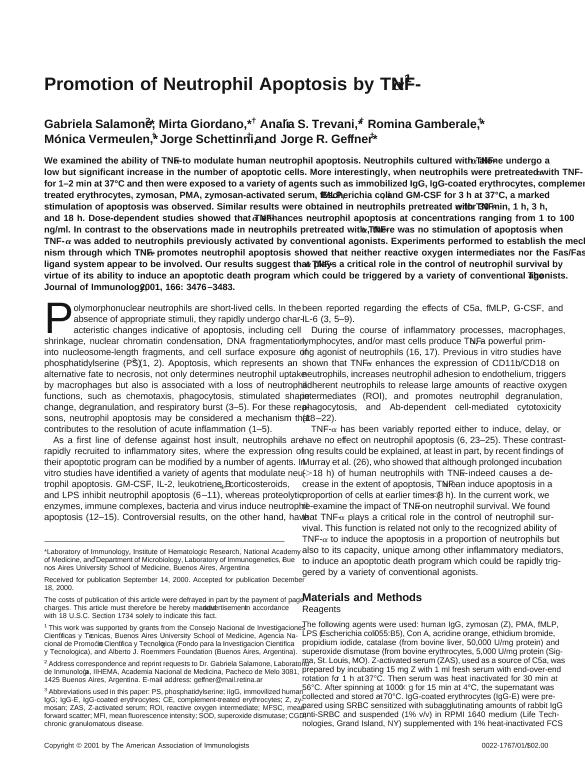Mostrar el registro sencillo del ítem
dc.contributor.author
Salamone, Gabriela Veronica

dc.contributor.author
Giordano, Mirta Nilda

dc.contributor.author
Trevani, Analía Silvina

dc.contributor.author
Gamberale, Romina

dc.contributor.author
Vermeulen, Elba Monica

dc.contributor.author
Schettinni, J.
dc.contributor.author
Geffner, Jorge Raúl

dc.date.available
2018-08-14T14:19:01Z
dc.date.issued
2001-03
dc.identifier.citation
Salamone, Gabriela Veronica; Giordano, Mirta Nilda; Trevani, Analía Silvina; Gamberale, Romina; Vermeulen, Elba Monica; et al.; Promotion of Neutrophil Apoptosis by TNF- α; American Association of Immunologists; Journal of Immunology; 166; 5; 3-2001; 3476-3483
dc.identifier.issn
0022-1767
dc.identifier.uri
http://hdl.handle.net/11336/55333
dc.description.abstract
We examined the ability of TNF-α to modulate human neutrophil apoptosis. Neutrophils cultured with TNF-α alone undergo a low but significant increase in the number of apoptotic cells. More interestingly, when neutrophils were pretreated with TNF-α for 1–2 min at 37°C and then were exposed to a variety of agents such as immobilized IgG, IgG-coated erythrocytes, complement-treated erythrocytes, zymosan, PMA, zymosan-activated serum, fMLP, Escherichia coli, and GM-CSF for 3 h at 37°C, a marked stimulation of apoptosis was observed. Similar results were obtained in neutrophils pretreated with TNF-α for 30 min, 1 h, 3 h, and 18 h. Dose-dependent studies showed that TNF-α enhances neutrophil apoptosis at concentrations ranging from 1 to 100 ng/ml. In contrast to the observations made in neutrophils pretreated with TNF-α, there was no stimulation of apoptosis when TNF-α was added to neutrophils previously activated by conventional agonists. Experiments performed to establish the mechanism through which TNF-α promotes neutrophil apoptosis showed that neither reactive oxygen intermediates nor the Fas/Fas ligand system appear to be involved. Our results suggest that TNF-α plays a critical role in the control of neutrophil survival by virtue of its ability to induce an apoptotic death program which could be triggered by a variety of conventional agonists. Polymorphonuclear neutrophils are short-lived cells. In the absence of appropriate stimuli, they rapidly undergo characteristic changes indicative of apoptosis, including cell shrinkage, nuclear chromatin condensation, DNA fragmentation into nucleosome-length fragments, and cell surface exposure of phosphatidylserine (PS)3 (1, 2). Apoptosis, which represents an alternative fate to necrosis, not only determines neutrophil uptake by macrophages but also is associated with a loss of neutrophil functions, such as chemotaxis, phagocytosis, stimulated shape change, degranulation, and respiratory burst (3, 4, 5). For these reasons, neutrophil apoptosis may be considered a mechanism that contributes to the resolution of acute inflammation (1, 2, 3, 4, 5). As a first line of defense against host insult, neutrophils are rapidly recruited to inflammatory sites, where the expression of their apoptotic program can be modified by a number of agents. In vitro studies have identified a variety of agents that modulate neutrophil apoptosis. GM-CSF, IL-2, leukotriene B4, corticosteroids, and LPS inhibit neutrophil apoptosis (6, 7, 8, 9, 10, 11), whereas proteolytic enzymes, immune complexes, bacteria and virus induce neutrophil apoptosis (12, 13, 14, 15). Controversial results, on the other hand, have been reported regarding the effects of C5a, fMLP, G-CSF, and IL-6 (3, 5, 6, 7, 8, 9). During the course of inflammatory processes, macrophages, lymphocytes, and/or mast cells produce TNF-α, a powerful priming agonist of neutrophils (16, 17). Previous in vitro studies have shown that TNF-α enhances the expression of CD11b/CD18 on neutrophils, increases neutrophil adhesion to endothelium, triggers adherent neutrophils to release large amounts of reactive oxygen intermediates (ROI), and promotes neutrophil degranulation, phagocytosis, and Ab-dependent cell-mediated cytotoxicity (18, 19, 20, 21, 22). TNF-α has been variably reported either to induce, delay, or have no effect on neutrophil apoptosis (6, 23, 24, 25). These contrasting results could be explained, at least in part, by recent findings of Murray et al. (26), who showed that although prolonged incubation (>18 h) of human neutrophils with TNF-α indeed causes a decrease in the extent of apoptosis, TNF-α can induce apoptosis in a proportion of cells at earlier times (<8 h). In the current work, we re-examine the impact of TNF-α on neutrophil survival. We found that TNF-α plays a critical role in the control of neutrophil survival. This function is related not only to the recognized ability of TNF-α to induce the apoptosis in a proportion of neutrophils but also to its capacity, unique among other inflammatory mediators, to induce an apoptotic death program which could be rapidly triggered by a variety of conventional agonists.
dc.format
application/pdf
dc.language.iso
eng
dc.publisher
American Association of Immunologists

dc.rights
info:eu-repo/semantics/openAccess
dc.rights.uri
https://creativecommons.org/licenses/by-nc-sa/2.5/ar/
dc.subject.classification
Inmunología

dc.subject.classification
Medicina Básica

dc.subject.classification
CIENCIAS MÉDICAS Y DE LA SALUD

dc.title
Promotion of Neutrophil Apoptosis by TNF- α
dc.type
info:eu-repo/semantics/article
dc.type
info:ar-repo/semantics/artículo
dc.type
info:eu-repo/semantics/publishedVersion
dc.date.updated
2018-08-08T14:48:30Z
dc.journal.volume
166
dc.journal.number
5
dc.journal.pagination
3476-3483
dc.journal.pais
Estados Unidos

dc.journal.ciudad
Bethesda
dc.description.fil
Fil: Salamone, Gabriela Veronica. Consejo Nacional de Investigaciones Científicas y Técnicas. Instituto de Medicina Experimental. Academia Nacional de Medicina de Buenos Aires. Instituto de Medicina Experimental; Argentina
dc.description.fil
Fil: Giordano, Mirta Nilda. Consejo Nacional de Investigaciones Científicas y Técnicas. Instituto de Medicina Experimental. Academia Nacional de Medicina de Buenos Aires. Instituto de Medicina Experimental; Argentina
dc.description.fil
Fil: Trevani, Analía Silvina. Consejo Nacional de Investigaciones Científicas y Técnicas. Instituto de Medicina Experimental. Academia Nacional de Medicina de Buenos Aires. Instituto de Medicina Experimental; Argentina
dc.description.fil
Fil: Gamberale, Romina. Consejo Nacional de Investigaciones Científicas y Técnicas. Instituto de Medicina Experimental. Academia Nacional de Medicina de Buenos Aires. Instituto de Medicina Experimental; Argentina
dc.description.fil
Fil: Vermeulen, Elba Monica. Consejo Nacional de Investigaciones Científicas y Técnicas. Instituto de Medicina Experimental. Academia Nacional de Medicina de Buenos Aires. Instituto de Medicina Experimental; Argentina
dc.description.fil
Fil: Schettinni, J.. Universidad de Buenos Aires. Facultad de Medicina; Argentina
dc.description.fil
Fil: Geffner, Jorge Raúl. Consejo Nacional de Investigaciones Científicas y Técnicas. Instituto de Medicina Experimental. Academia Nacional de Medicina de Buenos Aires. Instituto de Medicina Experimental; Argentina
dc.journal.title
Journal of Immunology

dc.relation.alternativeid
info:eu-repo/semantics/altIdentifier/doi/https://dx.doi.org/10.4049/jimmunol.166.5.3476
dc.relation.alternativeid
info:eu-repo/semantics/altIdentifier/url/http://www.jimmunol.org/content/166/5/3476
Archivos asociados
